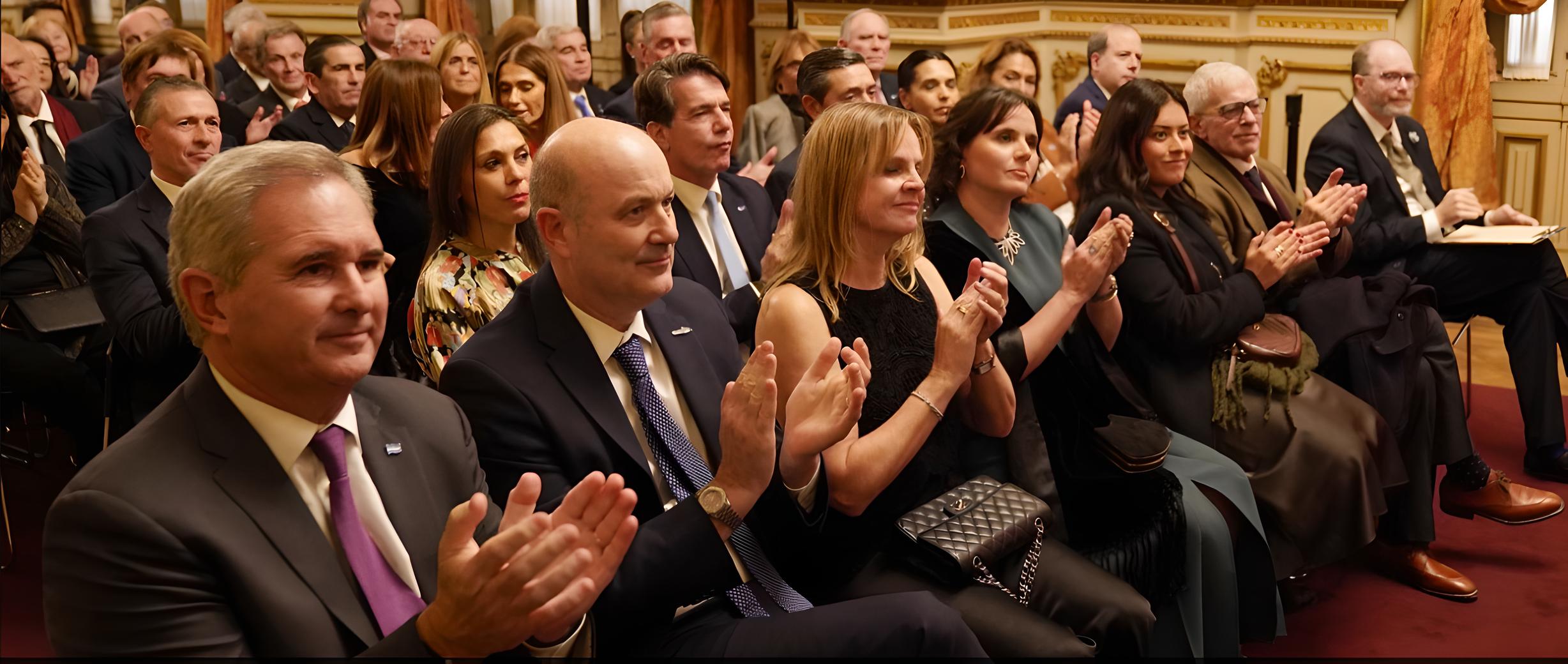El Teatro Colón, emblema de la cultura argentina, fue recientemente el escenario de un acto que ofende a la soberanía nacional. Se trató de la despedida de la embajadora británica Kirsty Hayes, la cual congregó a una notable concurrencia de funcionarios, empresarios y, lo más llamativo, militares de alto rango de la República Argentina. Un suceso que, más allá de la formalidad diplomática, expone una dolorosa contradicción en el corazón mismo de la identidad argentina frente a la persistente ocupación de las Islas Malvinas y la avanzada colonial británica.
Desde 1833, el Reino Unido mantiene una usurpación ilegítima sobre las Islas Malvinas, Georgias del Sur, Sandwich del Sur y un vastísimo espacio marítimo de 1.6 millones de kilómetros cuadrados en el Atlántico Sur. Este territorio, rico en recursos, es escenario de un flagrante saqueo sistemático de 250.000 toneladas anuales de recursos pesqueros, violando resoluciones de las Naciones Unidas. A ello se suman el avanzado proyecto de explotación petrolera, la construcción de un gran puerto de aguas profundas y la alarmante presencia de una base militar operada por la OTAN en Mount Pleasant/Monte Agradable.
Estos hechos no son meros puntos en una agenda diplomática; son los pilares de un colonialismo activo que avanza sin pausas.
El Cinismo de la Alta Diplomacia Británica
La embajadora Hayes, en su discurso, evocó una "relación privilegiada" entre ambos países en el siglo XIX, elogiando la actual marcha económica de Argentina. Sin embargo, detrás de la retórica de prosperidad y la ópera "Billy Budd" (del compositor británico Benjamin Britten) que se escuchaba en el Colón, se esconde la cruda realidad de una potencia que históricamente ha cimentado su riqueza en el despojo, la destrucción y la muerte en todo el planeta.
La presencia de figuras gubernamentales como los ministros Federico Sturzenegger y Mariano Cúneo Libarona, y los jefes del Estado Mayor Conjunto, el brigadier Xavier Isaac, del Ejército, el teniente general Carlos Presti, y de la Armada, el almirante Carlos Allievi, resulta incomprensible para quienes entienden que la soberanía no es un mero formalismo, sino un principio irrenunciable.

La asistencia de estos altos mandos militares es un golpe a la memoria de los caídos en 1982 y la lucha por la recuperación de nuestras islas. Es una imagen que choca violentamente con el deber de defender la Patria frente a quienes la oprimen. ¿Puede un militar argentino rendir honores a la representante de una nación que mantiene una base de la OTAN en nuestro propio territorio usurpado y que explota nuestros recursos de manera ilegal? La respuesta es un rotundo no.
El rol funcional de lacayos de Excombatientes y Familiares
En una nota publicada días pasados por Clarín, se subraya la presencia y el aplauso de Kirsty Hayes para el excombatiente de Malvinas Julio Aro , creador de la Fundación No Me Olvides, y María Fernanda Araujo , exdiputada y expresidenta de la Comisión de Familiares de los Caídos en Malvinas. Si bien la búsqueda de la identificación de los soldados caídos es una causa justa y humana, la articulación de estas figuras con la diplomacia británica en este contexto es profundamente vergonzosa y detestable.
Gran Bretaña fue la responsable directa de la pérdida de identidad de muchos héroes argentinos, al haber removido sus restos de los sitios donde cayeron en combate, violando flagrantemente las Convenciones de Ginebra, que estableció que el lugar de la caída de un soldado es su tumba. Presentar a Gran Bretaña como un "imperio humanista" por "retomar el trabajo humanitario conjunto" y permitir visitas a las tumbas, tras décadas de silencio y negación, es una maniobra cínica que busca blanquear su imagen.
La presencia y el aplauso a Aro y Araujo en la despedida de la embajadora británica, resultan funcionales a esta estrategia, generando en la opinión pública la peligrosa ilusión de una relación donde no hay un colonizador y un colonizado, sino una hermandad que distorsiona la realidad. Es un acto de voluntario sometimiento cultural y una preocupante vocación de coloniaje.
La despedida de la embajadora Hayes en el Teatro Colón, con la presencia de altos funcionarios y militares argentinos, y con el aplauso a quienes refuerzan el relato británico, es un doloroso recordatorio de que el colonialismo no solo se ejerce con armas, sino también a través del cinismo diplomático y la manipulación de la memoria. La defensa de la soberanía exige coherencia y firmeza, no gestos que validen la opresión y el saqueo. Es hora de despertar de esta peligrosa fantasía de una "relación privilegiada" con un imperio que aún hoy mantiene su bota sobre nuestra tierra y nuestros recursos.


